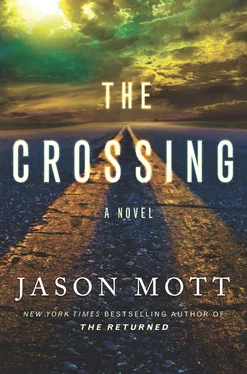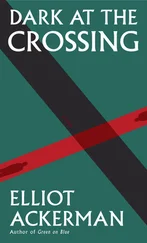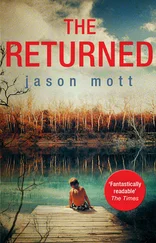Something in Gannon’s voice told me that maybe he actually hated his job.
“At least I’m still a part of the way things used to be,” Gannon said proudly. “There’s honor in that.” He took a deep breath and stared at me. He sat with his back erect and his chin thrust forward, as though he were posing for a picture. “You make sure you remember that part,” he said.
And, of course, I did remember that part. And all the other parts as well. I remembered the way he looked a little afraid when he talked about his not yet being made sheriff. I remembered the way his voice quickened when he talked about the sudden decline of his father—the way a child speeds up their pace as they pass an old abandoned house whose walls and gables have become nothing more than an empty husk. I remembered everything, with unrelenting clarity. To hear Jim tell it, his father had been a smiling, confident man. The type of man that other men wanted to be. The type of man Jim Gannon wanted to be.
And then, one day, that man was gone and all that was left behind was an invalid.
No matter how much he took care of the man, I’m not sure Jim Gannon ever forgave his father for that.
When Gannon had finished speaking, his wife and Tommy were pulling up in the yard. Gannon got up in a hurry and returned his scrapbook to his bedroom and came back out. “No need to talk to them about this,” he said to me in the solid, familiar voice I hadn’t heard in an hour and a half.
“I hadn’t planned to,” I replied.
And then, in a whisper, just before the front door opened and his wife and foster son came in, Gannon said, “Thank you.”
He had been like every other foster parent in the beginning, back when Jennifer was still with him. Back when The Disease was becoming more aggressive and the war seemed like something that might come to an end just like every other that had come before it. The two of them couldn’t have any children on their own—his fault—and so they decided to adopt and with him being well-off in the police force, it wasn’t too hard to make happen.
Everyone was trying to have children back then. The population of people over eighty had dwindled and those in their seventies were beginning to go. Back then there were still theories about being able to stop it. And some people say that’s what really started the war: the hope that some other country knew something about The Disease and was keeping it to themselves, hoping to outlive the rest of the world. Pregnancy rates tripled in those first years. Everyone hoping to fix the end of people by simply making more people.
And for those who couldn’t have their own, adoption became the fix. That’s how Tommy and I found Gannon and Jennifer. They came to our group home that day wearing their best Sunday outfits and smiling with the pleased euphoria of people in magazine ads. They’d both been told about how special I was and Jennifer had made it a point to say that “All kids are special.” At which point Tommy looked over at her with something akin to pity in his eyes and said, matter-of-factly, “That’s bullshit.”
Jennifer laughed a nervous laugh, and eventually Jim joined in and it wasn’t long before the laughter wasn’t nervous anymore. It was as good of an introduction to foster parents as we had ever had. Not that it really mattered. We were fifteen by then. Jennifer and Jim would be the last stop before we were too old for the system.
Over the next two years I watched Jim Gannon harden for reasons no one in the household seemed to be able to understand. He came home after work and talked a little less each day. Mostly he settled in front of the television and heard what it had to say. When the news wasn’t talking about The Disease it was talking about the war. And Gannon seemed interested only in the war.
Night after night he watched the reporters wearing bulletproof vests atop polo shirts as they hunkered down inside bombed-out buildings. They yelled about “total destruction” or “total resistance” while gunfire clattered like microwave popcorn somewhere off screen. Now and again they covered their ears and pressed their heads against the ruined floors of faraway war zones and they waited, mumbling to themselves, trying to look both brave and terrified all at once. Then there would be an explosion big enough to make the camera shudder. Maybe followed by a cloud of dust. Then the reporters would lift their head from the sand and look around with bewilderment and say, “Thank God. That was a close one.”
Every day Gannon was there watching. Sometimes he gripped the arms of the chair beneath him until his knuckles went white and his face reddened because he didn’t know he was holding his breath. Then he would realize and the air would rush into his lungs and he’d have to go outside for a smoke to calm down.
Jennifer would go out to him sometimes. I listened from the upstairs window as Jennifer begged Gannon to tell her what was wrong. Begged him to seek help for whatever it was. Begged him to “come back to me.” She even took time to blame herself for their inability to have a child and fix the world like everyone else was trying to do.
None of it worked, though.
He grew harder.
He drank more.
They drifted apart.
Sometimes when he was drunk he would fly into a fit of rage. Thundering voice. High-flying hands that threw dishes and put holes in drywall. And when the rage was over he would retreat to his wife’s bedroom door and knock, gently, like a child, and whisper, “I’m sorry, Jen. I’m sorry, okay? Just open the door. Please.”
And Jennifer, because she was a soft woman capable of forgiving anything, always opened the door and let him in. Then I would sit in my bedroom, usually with Tommy not far away, and I would listen while Gannon slumped to his knees like a sack of potatoes, sobbing apologies into the late hours of the night. All the while his wife would whisper—the soft sound of her voice drifting through the walls like an incantation—and her whispers would be full of forgiveness and something more. Absolution maybe.
I had once asked Jennifer why she forgave Gannon the way she did. “Because,” Jennifer said, “the heart can break and break and break again, but then turn around and love like it’s never known how.”
Jennifer held out hope for her and Gannon’s emotional resurrection. But I knew better.
If this had all happened when I was younger, I might have been inclined to lie awake at night worrying about the fate of my latest set of foster parents. But The Memory Gospel was full of foster parents whose relationships didn’t last. Foster parents who had taken in foster children in the hopes that by filling the empty places in their home they would fill the empty places in their hearts. That’s all children really were when you got right down to it, I figured: just a person’s attempt to create someone who loved them wholly and completely, from birth. Someone who would carry that love forever.
Children, in the end, were gods of our own design. And when you couldn’t build your own god, you called social services and had one delivered. But I was tired of being someone else’s therapy.
It was during one of Gannon’s outbursts a few months ago that I made the decision that Tommy and I should run away.
“To Florida?” Tommy asked. It was late and Gannon was in the living room screaming and Jennifer was in her bedroom refusing to let him come in. The house trembled and shook, but continued standing.
“To the launch,” I replied.
“This is that whole Jupiter thing again, right?” Tommy asked.
I sighed a long, slow, damning sigh. I would have to explain it all yet again to my brother. “Not Jupiter,” I began. “Europa. One of Jupiter’s moons.”
“Still don’t care,” Tommy said.
Читать дальше












